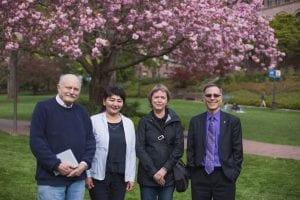American Center for Mongolian Studies
American Center for Mongolian Studies, in collaboration with one or more of its partner universities, periodically hosts a National Endowment for the Humanities Summer Institute for School Teachers. These intensive workshops for approximately twenty-five K-12 humanities teachers help expand the school curriculum to include Mongolian history and culture in a global context.
Australian National University
Australian National University established the Mongolia Institute in 2013 to promote Mongolian Studies at the university and throughout Australasia. The Institute provides advice and information to the university, government organizations, and the general public, and It supports Australian researchers working on Mongolia projects. Through its College of Asia & the Pacific, ANU offers several courses in Mongolian Studies, including introductory Mongolian, the Mongol Empire in world history, Inner Asian frontier history, as well as opportunities for ANU students to study in Mongolia. The Institute also hosts and organizes conferences and seminars, publishes a Mongolian Studies newsletter, and supports postgraduate students in Mongolian Studies.

In partnership with Open Universities Australia, ANU offers two entirely online courses in the Mongolian language. In Mongolian 1, students will learn pronunciation, recognize and reproduce Mongolian Cyrillic script, build a modest vocabulary, produce and practice sentence structures, and conduct simple conversations. Mongolian 2 is designed to expand students’ vocabulary, introduce the grammar necessary for reading and writing short texts, and conducting longer conversations.
Harvard University
Harvard University Department of East Asian Languages and Civilizations offers classical Mongolian language instruction focused on reading and translation ability. Courses are aimed at researchers intending to work in history, linguistics, religion, or other disciplines. Elementary Written Mongolian, Intermediate and Advanced Written Mongolian, and additional reading courses are offered in alternating years.
Indiana University Bloomington
Indiana University Bloomington in Indiana offers an intensive summer program in introductory Mongolian. The approximately 8-week course for beginners provides 160 hours of instruction and 20+ hours in co-curricular activities. Students who successfully complete the course will be able to communicate orally in Mongolian, write and read on familiar topics, and have a solid foundation for travel or further study. The Department of Central Eurasian Studies in the School of Global and International Studies offers three years of Mongolian language instruction, including almost a dozen courses in Mongolian history, culture, literature, and folklore.
University of California, Berkeley
University of California, Berkeley is home to the inter-disciplinary Mongolia Initiative within the Institute of East Asian Studies. The Initiative offers courses in elementary and literary Mongolian, Buddhist arts of Tibet and Mongolia, and Mongolian history and culture.
University of Pennsylvania
University of Pennsylvania East Asian Languages and Civilizations Department began offering introductory Mongolian language classes in 2018 in order to expand the university’s Mongolian Studies program and increase campus awareness about Mongolian culture. Among other responsibilities, the Center for East Asian Studies (CEAS) at Penn coordinates and supports East Asia courses and research and sponsors speakers, conferences, and colloquia on related topics. In 2014 CEAS became home to the U.S. offices of the American Center for Mongolian Studies.
Western Washington University
Western Washington University Center for East Asian Studies, and more recently the Office for Global Engagement, have provided a nexus for teaching and research on Mongolia since 1973. During the Mongolia Program’s first decades under the leadership of Professor Henry G. Schwarz, Western offered at least three Mongolian Studies courses each year. Tutorials in classical Mongolian and  Mongolian scripts were taught on demand, and Western offered a regular class in first-year contemporary Mongolia. In the 1980s, students wanting intensive courses in beginning and intermediate Mongolian studied during the summer at Inner Mongolian University in Hohhot. With support from the Henry G. Schwarz and John C. (“Jack”) Street endowment funds, Western’s Mongolian Studies curriculum has enjoyed a resurgence. Visiting and permanent faculty from across the university offer a variety of courses in Mongolian Studies, including an introduction to Mongolian language and culture, history of the Mongols, and nomadic peoples of Eurasia. The university also provides financial support to Western faculty, undergraduates, and graduate students engaged in research in Mongolia. Field research topics have included women in leadership as well as the connections between climate change and mental health.
Mongolian scripts were taught on demand, and Western offered a regular class in first-year contemporary Mongolia. In the 1980s, students wanting intensive courses in beginning and intermediate Mongolian studied during the summer at Inner Mongolian University in Hohhot. With support from the Henry G. Schwarz and John C. (“Jack”) Street endowment funds, Western’s Mongolian Studies curriculum has enjoyed a resurgence. Visiting and permanent faculty from across the university offer a variety of courses in Mongolian Studies, including an introduction to Mongolian language and culture, history of the Mongols, and nomadic peoples of Eurasia. The university also provides financial support to Western faculty, undergraduates, and graduate students engaged in research in Mongolia. Field research topics have included women in leadership as well as the connections between climate change and mental health.